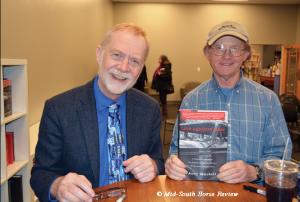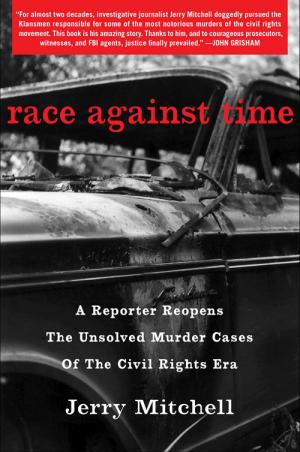By Nancy Brannon, Ph.D.
Renowned investigative reporter Jerry Mitchell of the Jackson, Miss. Clarion Ledger was the guest author at Novel Bookstore in Memphis, Tenn. on February 12, 2020. He also toured other mid-south bookstores in Jackson, Oxford, Greenwood, and Tupelo, Miss. in February. His 30-year career as an investigative reporter for the newspaper included investigations of some of the most notorious “cold cases” of the Civil Rights era. Mitchell talked about his book, Race Against Time (2020), and told some fascinating stories about the people he interviewed and the events that unfolded in his investigations.
It is said that today’s news becomes tomorrow’s history, but it’s also true that yesterday’s history can re-emerge into today’s news. It wasn’t called domestic terrorism then, but in the 1960s Civil Rights era, people who worked for the right to vote, the right to be served at restaurants, the right to ride in the seat of their choice in public transit, and other forms of social change were victims of beatings, murder, assassination, fire-bombing, and other forms of domestic terrorism. Mitchell noted, “The hate that caused such destruction has not gone away,” and cited several instances of modern “hate crimes,” which have been seen at church and synagogue shootings, and even running over with a car, and killing, a demonstrator in Charlottesville, Virginia.
Imagine your husband or father driving home as usual one evening, pulling into the driveway and getting out of his car. But before he can make it into his home, he is gunned down in the driveway.
Imagine taking a summer off from college to do some social service work helping register people to vote. But you never return to school because you have been murdered – and have disappeared.
Imagine going to church as usual on Sunday morning, and while there, your church is bombed and four young girls are killed.
Imagine receiving death threats to you and your family for registering people to vote. You try to be vigilant in protecting your home and family, but one night your home is attacked by people firing bullets into your home and gas jugs being thrown in the windows so that soon your whole house erupts in fire. You (and your family) manage to barely escape, but you are so severely burned that you die the next day, and your entire home has been destroyed.
Now imagine that none of the people responsible for these crimes were ever brought to trial or convicted of the crimes.
This is where Jerry Mitchell comes on the scene. Back in 1989, when he was a court reporter for the Clarion Ledger, seeing the film Mississippi Burning inspired him to investigate several civil rights cold cases. His book, Race Against Time, takes readers through his investigations of four infamous cold cases that led to their reopening and the prosecution of those responsible for these crimes: the assassination of Medgar Evers; the firebombing of Vernon Dahmer; the bombing of the Sixteenth Street Baptist Church in Birmingham, Alabama; and the murders of three civil rights workers: Michael Schwerner, James Chaney, and Andrew Goodman. His investigations uncovered sufficient evidence to prosecute Byron De La Beckwith (Medgar Evers), KKK Imperial Wizard Sam Bowers (Vernon Dahmer), Bobby Cherry (Birmingham church), and Edgar Ray Killen (Schwerner, Chaney & Goodman). To date, Mitchell has been instrumental in getting 24 convictions in these civil rights cold cases.
Many of the accounts in his book are depressing, as well as frustrating. But Mitchell reveals the perspectives of those he interviewed and combines his harrowing experiences with some humorous incidents that happened in the course of his investigations and subsequent trials. Mitchell is such a good story teller that he will hook you into the book and not let go. He painstakingly reveals the difficulties of trying to locate information, find witnesses, interview people about the cases, and scan scores of case-related documents, which keep the reader glued to the book, wanting to find out what happens next. “Sometimes the biggest breaks come from the lease likely places,” Mitchell wrote about finding the Sovereignty Commission records by happenstance. Even though I knew the history of these cases and knew the outcome, the book is so intriguing that I couldn’t put it down!
One of the humorous stories he related involved Deavours Nix, who was charged in the Vernon Dahmer firebombing case in 1998. He first appeared in court in a wheel chair and breathing with the aid of an oxygen tank. At Novel Bookstore, Mitchell imitated how Nix spoke to the judge about his health problems and persuaded the judge to waive his bond. But when Mitchell heard that Nix planned to play golf at a local club, Mitchell arranged to have the golf outing photographed and the photos ran in the Clarion-Ledger. The judge ordered Nix jailed.
Another humorous incident takes the reader inside the courtroom, where 80-year-old attorney Lawrence Arrington, who had represented Deavours Nix in the 1960s, is representing him again in the 1998 trial. “Before Deavours Nix took the witness stand, I overheard him talking to his lawyer, Lawrence Arrington. Arrington advised him that he would signal him with a raised hand if Nix needed to claim his Fifth Amendment rights against self-incrimination. Nix began testifying, and several minutes later, I glanced back at Arrington, who was fast asleep. So much for the signaling.” (p.209)
One of the interesting sources of information was the records kept by the Mississippi Sovereignty Commission, a government organization with a spy arm. “Every major official in Mississippi was a part of the Sovereignty Commission,” Mitchell said. The files had been sealed, but Mitchell was able to develop sources who had access to these secret files and they would leak information to him.
One theme that Mitchell promotes from this book is the idea of living fearlessly, not meaning living without fear, but meaning living for something greater than ourselves.
Another theme is redemption. Mitchell relates the story of the day that one of those convicted in the Vernon Dahmer firebombing, Billy Roy Pitts, apologized to Mrs. Dahmer for killing her husband and asked for her forgiveness. Mrs. Dahmer forgave him and “with those words, he could no longer hold back the tears, and neither could the children of Vernon Dahmer.” (p. 217)
Mitchell says, “Telling about [these incidents] can help lead to understanding. We are now, still, in a race against time in our country. Can we all learn to live together and remain a united nation? Race is so complicated,” yet we try to make it either/or, black or white. “When you begin to address some of the issues, it actually helps the community. Burying these issues hurts the community.” Mitchell said that two years after Edgar Ray Killen, the KKK organizer who planned and directed the murders of the three civil rights workers, was convicted, Philadelphia, Mississippi elected its first black mayor (2009).
In 2018, Mitchell left the Clarion Ledger to found the non-profit news organization, Mississippi Center for Investigative Reporting (MCIR). Mitchell concluded his talk with information about the center, the only statewide news entity dedicated solely to investigative journalism, and their current projects. His latest project, which began in January last year, is reporting on the state of Mississippi prisons. In February, in the wake of uprisings inside Mississippi’s prisons that left five dead, the U.S. Justice Department launched an investigation into the living conditions in four Mississippi prisons. Mitchell is also investigating juveniles in Mississippi sentenced to life in prison without parole. About 75% of them are African American, he said.
Mitchell is concerned about the future of journalism, in which the corporate, for-profit model is not working, he said. “How do we fund good journalism in a non-profit model?” he asked. He said MCIR relies on private donations and shares their articles with members of the Mississippi Press Association free of charge.
Find more information about Jerry Mitchell and the MCIR at: www.mississippicir.org, on facebook and twitter. “Shining light; exposing darkness.” Mitchell is also a MacArthur Foundation Fellow.
Read NPR’s Mary Louise Kelly’s interview with Mitchell in Dec. 2018 here: https://www.npr.org/2018/12/31/681286872/journalist-jerry-mitchell-discusses-decades-investigating-civil-rights-era-killi
Renowned investigative reporter Jerry Mitchell of the Jackson, Miss. Clarion Ledger was the guest author at Novel Bookstore in Memphis, Tenn. on February 12, 2020. He also toured other mid-south bookstores in Jackson, Oxford, Greenwood, and Tupelo, Miss. in February. His 30-year career as an investigative reporter for the newspaper included investigations of some of the most notorious “cold cases” of the Civil Rights era. Mitchell talked about his book, Race Against Time (2020), and told some fascinating stories about the people he interviewed and the events that unfolded in his investigations.
It is said that today’s news becomes tomorrow’s history, but it’s also true that yesterday’s history can re-emerge into today’s news. It wasn’t called domestic terrorism then, but in the 1960s Civil Rights era, people who worked for the right to vote, the right to be served at restaurants, the right to ride in the seat of their choice in public transit, and other forms of social change were victims of beatings, murder, assassination, fire-bombing, and other forms of domestic terrorism. Mitchell noted, “The hate that caused such destruction has not gone away,” and cited several instances of modern “hate crimes,” which have been seen at church and synagogue shootings, and even running over with a car, and killing, a demonstrator in Charlottesville, Virginia.
Imagine your husband or father driving home as usual one evening, pulling into the driveway and getting out of his car. But before he can make it into his home, he is gunned down in the driveway.
Imagine taking a summer off from college to do some social service work helping register people to vote. But you never return to school because you have been murdered – and have disappeared.
Imagine going to church as usual on Sunday morning, and while there, your church is bombed and four young girls are killed.
Imagine receiving death threats to you and your family for registering people to vote. You try to be vigilant in protecting your home and family, but one night your home is attacked by people firing bullets into your home and gas jugs being thrown in the windows so that soon your whole house erupts in fire. You (and your family) manage to barely escape, but you are so severely burned that you die the next day, and your entire home has been destroyed.
Now imagine that none of the people responsible for these crimes were ever brought to trial or convicted of the crimes.
This is where Jerry Mitchell comes on the scene. Back in 1989, when he was a court reporter for the Clarion Ledger, seeing the film Mississippi Burning inspired him to investigate several civil rights cold cases. His book, Race Against Time, takes readers through his investigations of four infamous cold cases that led to their reopening and the prosecution of those responsible for these crimes: the assassination of Medgar Evers; the firebombing of Vernon Dahmer; the bombing of the Sixteenth Street Baptist Church in Birmingham, Alabama; and the murders of three civil rights workers: Michael Schwerner, James Chaney, and Andrew Goodman. His investigations uncovered sufficient evidence to prosecute Byron De La Beckwith (Medgar Evers), KKK Imperial Wizard Sam Bowers (Vernon Dahmer), Bobby Cherry (Birmingham church), and Edgar Ray Killen (Schwerner, Chaney & Goodman). To date, Mitchell has been instrumental in getting 24 convictions in these civil rights cold cases.
Many of the accounts in his book are depressing, as well as frustrating. But Mitchell reveals the perspectives of those he interviewed and combines his harrowing experiences with some humorous incidents that happened in the course of his investigations and subsequent trials. Mitchell is such a good story teller that he will hook you into the book and not let go. He painstakingly reveals the difficulties of trying to locate information, find witnesses, interview people about the cases, and scan scores of case-related documents, which keep the reader glued to the book, wanting to find out what happens next. “Sometimes the biggest breaks come from the lease likely places,” Mitchell wrote about finding the Sovereignty Commission records by happenstance. Even though I knew the history of these cases and knew the outcome, the book is so intriguing that I couldn’t put it down!
One of the humorous stories he related involved Deavours Nix, who was charged in the Vernon Dahmer firebombing case in 1998. He first appeared in court in a wheel chair and breathing with the aid of an oxygen tank. At Novel Bookstore, Mitchell imitated how Nix spoke to the judge about his health problems and persuaded the judge to waive his bond. But when Mitchell heard that Nix planned to play golf at a local club, Mitchell arranged to have the golf outing photographed and the photos ran in the Clarion-Ledger. The judge ordered Nix jailed.
Another humorous incident takes the reader inside the courtroom, where 80-year-old attorney Lawrence Arrington, who had represented Deavours Nix in the 1960s, is representing him again in the 1998 trial. “Before Deavours Nix took the witness stand, I overheard him talking to his lawyer, Lawrence Arrington. Arrington advised him that he would signal him with a raised hand if Nix needed to claim his Fifth Amendment rights against self-incrimination. Nix began testifying, and several minutes later, I glanced back at Arrington, who was fast asleep. So much for the signaling.” (p.209)
One of the interesting sources of information was the records kept by the Mississippi Sovereignty Commission, a government organization with a spy arm. “Every major official in Mississippi was a part of the Sovereignty Commission,” Mitchell said. The files had been sealed, but Mitchell was able to develop sources who had access to these secret files and they would leak information to him.
One theme that Mitchell promotes from this book is the idea of living fearlessly, not meaning living without fear, but meaning living for something greater than ourselves.
Another theme is redemption. Mitchell relates the story of the day that one of those convicted in the Vernon Dahmer firebombing, Billy Roy Pitts, apologized to Mrs. Dahmer for killing her husband and asked for her forgiveness. Mrs. Dahmer forgave him and “with those words, he could no longer hold back the tears, and neither could the children of Vernon Dahmer.” (p. 217)
Mitchell says, “Telling about [these incidents] can help lead to understanding. We are now, still, in a race against time in our country. Can we all learn to live together and remain a united nation? Race is so complicated,” yet we try to make it either/or, black or white. “When you begin to address some of the issues, it actually helps the community. Burying these issues hurts the community.” Mitchell said that two years after Edgar Ray Killen, the KKK organizer who planned and directed the murders of the three civil rights workers, was convicted, Philadelphia, Mississippi elected its first black mayor (2009).
In 2018, Mitchell left the Clarion Ledger to found the non-profit news organization, Mississippi Center for Investigative Reporting (MCIR). Mitchell concluded his talk with information about the center, the only statewide news entity dedicated solely to investigative journalism, and their current projects. His latest project, which began in January last year, is reporting on the state of Mississippi prisons. In February, in the wake of uprisings inside Mississippi’s prisons that left five dead, the U.S. Justice Department launched an investigation into the living conditions in four Mississippi prisons. Mitchell is also investigating juveniles in Mississippi sentenced to life in prison without parole. About 75% of them are African American, he said.
Mitchell is concerned about the future of journalism, in which the corporate, for-profit model is not working, he said. “How do we fund good journalism in a non-profit model?” he asked. He said MCIR relies on private donations and shares their articles with members of the Mississippi Press Association free of charge.
Find more information about Jerry Mitchell and the MCIR at: www.mississippicir.org, on facebook and twitter. “Shining light; exposing darkness.” Mitchell is also a MacArthur Foundation Fellow.
Read NPR’s Mary Louise Kelly’s interview with Mitchell in Dec. 2018 here: https://www.npr.org/2018/12/31/681286872/journalist-jerry-mitchell-discusses-decades-investigating-civil-rights-era-killi










